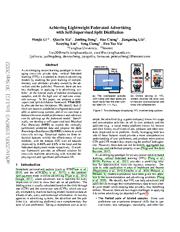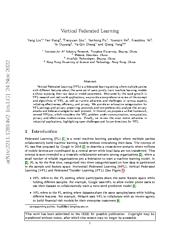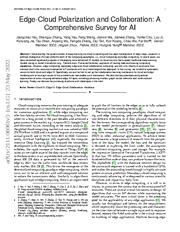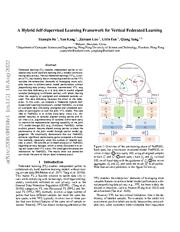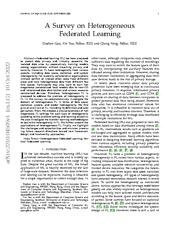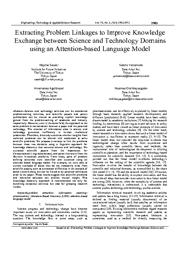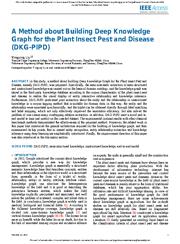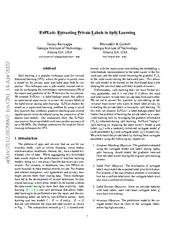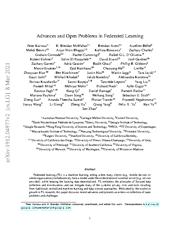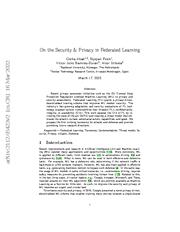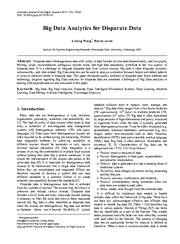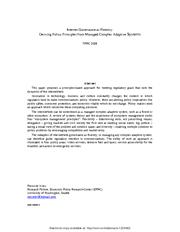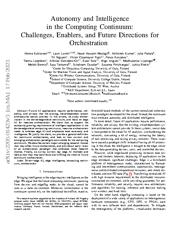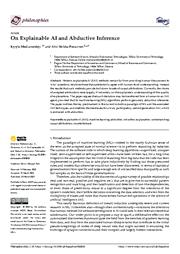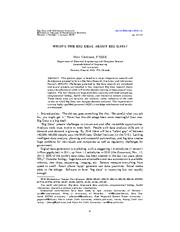A copy of this work was available on the public web and has been preserved in the Wayback Machine. The capture dates from 2022; you can also visit the original URL.
The file type is application/pdf.
Filters
Achieving Lightweight Federated Advertising with Self-Supervised Split Distillation
[article]
2022
arXiv
pre-print
In this paper, we propose a semi-supervised split distillation framework VFed-SSD to alleviate the two limitations. ...
Specifically, we develop a self-supervised task Matched Pair Detection (MPD) to exploit the vertically partitioned unlabeled data and propose the Split Knowledge Distillation (SplitKD) schema to avoid ...
Conclusion and Future Work In this paper, we propose a semi-supervised VFL framework VFed-SSD for cross-silo display advertising. ...
arXiv:2205.15987v3
fatcat:hknahx6qffeinjm7lwiblvvc4e
Vertical Federated Learning: Concepts, Advances and Challenges
[article]
2023
arXiv
pre-print
Vertical Federated Learning (VFL) is a federated learning setting where multiple parties with different features about the same set of users jointly train machine learning models without exposing their ...
Semi-SL, Self-SL, TL, DA, SVD and NAS represent semi-supervised learning, self-supervised learning, transfer learning, data augmentation, singular vector decomposition, neural architecture search, respectively ...
HFL can be either cross-device or cross-silo FL, while VFL typically belongs to the cross-silo FL. We compare these main differences between HFL, VFL, and FTL in Table 1 . ...
arXiv:2211.12814v4
fatcat:kjps7i2zrfd3bjcoqiv32p6sbi
Edge-Cloud Polarization and Collaboration: A Comprehensive Survey for AI
[article]
2022
arXiv
pre-print
Specifically, we are the first to set up the collaborative learning mechanism for cloud and edge modeling with a thorough review of the architectures that enable such mechanism. ...
However, edge computing, especially edge and cloud collaborative computing, are still in its infancy to announce their success due to the resource-constrained IoT scenarios with very limited algorithms ...
source domain with no target domain labels. [246] proposed Cross-Domain Landmark Selection as a semi-supervised solution. ...
arXiv:2111.06061v3
fatcat:5rq6s5s4cvcidblidgahwynp34
A Hybrid Self-Supervised Learning Framework for Vertical Federated Learning
[article]
2022
arXiv
pre-print
FedHSSL further exploits generic features shared among parties to boost the performance of the joint model through partial model aggregation. ...
The core idea of FedHSSL is to utilize cross-party views (i.e., dispersed features) of samples aligned among parties and local views (i.e., augmentations) of samples within each party to improve the representation ...
D Experimental Results
The impact of cross-party encoders' guidance on Local SSL and model aggregation The choice of γ controls the degree of the knowledge transferred from the cross-party encoder to ...
arXiv:2208.08934v1
fatcat:bpjzgzp4xzfqthc5xunofmmqpe
A Survey on Heterogeneous Federated Learning
[article]
2022
arXiv
pre-print
We also investigate the transfer learning methodologies to tackle the heterogeneity in FL. We further present the applications of heterogeneous FL. ...
Federated learning (FL) has been proposed to protect data privacy and virtually assemble the isolated data silos by cooperatively training models among organizations without breaching privacy and security ...
In cross-silo settings, recommenders from diverse industries may adopt federated transfer learning to bridge knowledge from different domains. ...
arXiv:2210.04505v1
fatcat:yxzkgbknhje7tdfevjnalsvuiq
Extracting Problem Linkages to Improve Knowledge Exchange between Science and Technology Domains using an Attention-based Language Model
2020
Zenodo
The creation of information silos in science and technology generates inefficiency in human intellectual production. ...
Therefore, this study examines whether insights from technical problems can be shared with academics to solve scientific problems. ...
Traditionally, patent citations to papers have been comprehensively studied to understand the transfer of knowledge from science to technology [28] . ...
doi:10.5281/zenodo.4016134
fatcat:j7o3zoywlrhahi5f33sfx57pka
A Method about Building Deep Knowledge Graph for the Plant Insect Pest and Disease (DKG-PIPD)
2021
IEEE Access
Specifically, the semi-automatic extraction of semi-structured and unstructured knowledge was carried out on the basis of domain ontology, and the knowledge graph was stored in the third-party knowledge ...
INDEX TERMS DKG-PIPD, semi-structured knowledge, unstructured knowledge, end-to-end model ...
, and well solves the problem of scattered, complex and siloed data in the field. ...
doi:10.1109/access.2021.3116467
fatcat:vyoluv7ln5ebnlrm3ogut32eoa
ExPLoit: Extracting Private Labels in Split Learning
[article]
2022
arXiv
pre-print
Our evaluations show that ExPLoit can uncover the private labels with near-perfect accuracy of up to 99.96%. Our findings underscore the need for better training techniques for VFL. ...
ExPLoit frames the attack as a supervised learning problem by using a novel loss function that combines gradient-matching and several regularization terms developed using key properties of the dataset ...
This work was partially supported by a gift from Facebook. We also gratefully acknowledge the support of NVIDIA Corporation with the donation of the Titan V GPU used for this research. ...
arXiv:2112.01299v2
fatcat:kbj2smtsvjegvpk4t2n6mmgxcq
Advances and Open Problems in Federated Learning
[article]
2021
arXiv
pre-print
This makes it a very suitable dataset to study federated transfer learning and multi-task learning in cross-silo settings. ...
Cross-Silo Federated Learning In contrast with the characteristics of cross-device federated learning, see Table 1 , cross-silo federated learning admits more flexibility in certain aspects of the overall ...
arXiv:1912.04977v3
fatcat:efkbqh4lwfacfeuxpe5pp7mk6a
On the Security Privacy in Federated Learning
[article]
2022
arXiv
pre-print
Learning can be supervised, unsupervised, semi-supervised, and reinforcement [99, 41] . We mainly focus on supervised learning for the rest of the paper. ...
Furthermore, SMC deals with cross-silo settings, where clients may be unreachable, dropouts are expected, and communications expensive. ...
Then, the server selected the model with a lower distance, i.e., the most similar. Therefore, the chosen model was benign for networks over 50% is not an adversary. ...
arXiv:2112.05423v2
fatcat:qcovp2cz2rfgbcvx6mtx5xighe
Big Data Analytics
2017
International Journal of Cognitive Informatics and Natural Intelligence
Challenges of Big Data analytics in dealing with disparate data are also discussed in this paper. ...
Disparate data is heterogeneous data with variety in data formats, diverse data dimensionality, and low quality. ...
W56HZV-08-C-0236, through a subcontract with Mississippi State University (MSU), and was completed for the Simulation Based Reliability and Safety (SimBRS) research program at MSU. ...
doi:10.4018/ijcini.2017040103
fatcat:yc2v7otbajhzzpadbnh3fgosda
Internet Governance as Forestry: Deriving Policy Principles from Managed Complex Adaptive Systems
2008
Social Science Research Network
Supervising the internet/web, or any complex adaptive system, entails dealing with incomplete knowledge, cross-linked hierarchies, phase transitions, and surprise. ...
Modularity is the design philosophy that builds functionality out of partial, separable and substitutable components, the modules. Modules are: − Partial. ...
doi:10.2139/ssrn.1229482
fatcat:zfcfh6c4zbf3lchmtrpuqy2o2a
Autonomy and Intelligence in the Computing Continuum: Challenges, Enablers, and Future Directions for Orchestration
[article]
2023
arXiv
pre-print
There is not yet a lot of work that consider knowledge transfer for agents learning with deep networks; however, there are works indicating that unprincipled knowledge transfer in MADRL can lead to more ...
The first aspect is referred to as intra-agent knowledge transfer, whereas the latter two belong to the interagent knowledge transfer. ...
arXiv:2205.01423v3
fatcat:g4wkzm5qzjhxpgiqmkjb3dghnu
On Explainable AI and Abductive Inference
2022
Philosophies
The paper argues that such decisions may be transferred from a human to an XAI agent, provided that its machine-learning (ML) algorithms perform genuinely abductive inferences. ...
Modern explainable AI (XAI) methods remain far from providing human-like answers to 'why' questions, let alone those that satisfactorily agree with human-level understanding. ...
The success of the software code in which deep learning algorithms-supervised, unsupervised, semi-supervised or self-supervised alike-have been written has, for a long time, hinged on the assumption that ...
doi:10.3390/philosophies7020035
doaj:52d93a6b70484b71af40490b609fc839
fatcat:4iunmqppebcbtithyqb77hlqim
What's the big deal about big data?
2015
Big Data & Information Analytics
The importance of training highly qualified personnel (HQP), knowledge mobilization and novelty are discussed. ...
Knowledge of the crystallization reaction of a given protein with a given cocktail implies partial knowledge of the reaction at neighbouring points, in protein space or cocktail space. ...
Knowledge of the crystallization reaction of a given protein with a given cocktail implies partial knowledge of the reaction at neighbouring points, in protein space or cocktail space. ...
doi:10.3934/bdia.2016.1.31
fatcat:wtdsmvgvvrfbjjui3v2cc56gbm
« Previous
Showing results 1 — 15 out of 944 results

